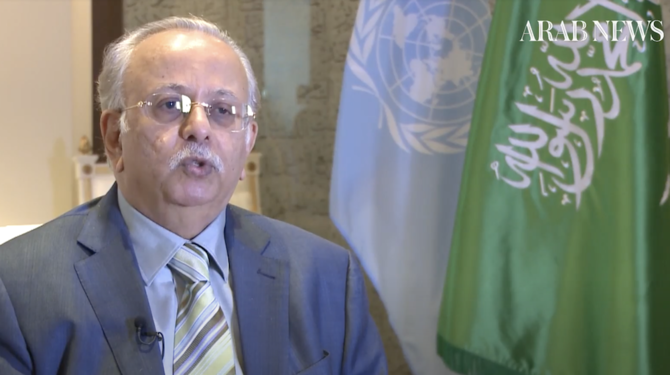NEW YORK: World leaders returned to the UN this week for their first in-person meeting in two years, as part of the 76th session of the General Assembly.
“The UN is open for business and we’re back to life,” Abdullah Al-Mouallimi, Saudi Arabia’s permanent representative to the UN, told Arab News.
He added that the return of the premiers to UN headquarters in New York City comes amid a heightened awareness of the vital need for international solidarity and “for working together, for caring for each other, because we all know no one is safe until everybody is safe.”
However the leaders face a daunting agenda filled with spiraling crises that will put their commitment to solidarity to the test. Extreme weather events are becoming more common as the planet warms as a result of climate change. Terrorist activity and conflicts are on the rise. And as the pandemic continues to rage, the “vaccine apartheid” that has emerged as wealthy nations stockpile doses is exposing the growing inequality between the world’s rich and poor.
The Arab world is dealing with its own set of crises. More than a year after the devastating explosion at Beirut’s port ripped the capital apart, Lebanon’s economy has collapsed and the country continues to slide ever deeper into darkness — literally, as a result of fuel shortages and power outages.
The situation in Yemen tops the list of the most severe humanitarian crises. The future of Libya remains uncertain as the country prepares for elections that might or might not happen.
Meanwhile the Arabian Gulf region is one of the most vulnerable to the effects of climate change, and Saudi Arabia’s efforts to do something about it have earned the Kingdom the title of a “world champion” in addressing the issue.
In an exclusive, wide-ranging interview with Arab News, Al-Mouallimi talked about the Kingdom’s vision for the future, along with its achievements in tackling domestic, regional and global challenges.
According to the latest UN figures, only 4 percent of people in developing countries have been vaccinated, compared with more than 60 percent of people in wealthy nations.
“The Kingdom of Saudi Arabia has taken a leading role to make sure that vaccines are available to countries that do not have them, that the World Health Organization is up to (the task) of meeting the requirements and the demands of the challenge, (and) that all countries are ready and prepared to deal with the situation,” said Al-Mouallimi.
This year’s General Assembly began just days after the 20th anniversary of the Sept. 11 terrorist attacks on the US. The commemorations were accompanied by a torrent of reflective debates about the so-called “war on terror,” its successes and failures, and the lessons it has taught the world. It is also one of the main topics on the assembly’s agenda.
The role played by Saudi Arabia in countering terrorism is “very prominent and well-noted,” said Al-Mouallimi, who added that many of the victories against terrorists would not have been possible without the Kingdom’s assistance.
But, terrorism has undoubtedly spread and become more complex and sophisticated in the past two decades, which begs the questions: Where did the world go wrong and what will it take to truly win this war?
Al-Mouallimi said the authorities in his country were able to achieve successes in the battle to defeat terrorism because they realized very early on that it is an international challenge as much as it is a local one.
It is also an “intergenerational war,” he added, and the Kingdom is under no illusions that the fight will end any time soon.
“It is going to take a long time and we have practiced patience and perseverance and (have) a long-term vision (for) counterterrorism.”
Saudis also realize, Al-Mouallimi said: “It takes a village, it takes a country, it takes a tribe, it takes a family, to overcome this scourge and this challenge.
“We in Saudi Arabia have not tried to (adopt) a one-solution-fits-all (approach). We did not limit ourselves to a simple military encounter, even though a military solution (sometimes) becomes necessary to deal with acts of terrorism.
“But at the same time we recognize that that (acting) alone is not enough. It takes more of a social approach to the issue, to finding out what are the root causes of terrorism, to finding out the circumstances that lead to the nurturing of terrorist activities in a certain country.”
Al-Mouallimi lamented the fact that authorities around the world often fail to grasp this concept and adopt the opposite approach.
“Many countries in the world have emphasized the military aspect only (and its) short-term victories” he said. “But the terrorists have a tendency to lie low when the pressure is high and to come back up again as soon as you relieve that pressure — and it’s proving almost impossible to maintain military pressure over time.”
He believes that the world must come together and address the root causes of terrorism, on the national and international levels, “such as marginalization, foreign occupation, oppression and exclusion.” These are the kind of things that “lead to people feeling desperate, and that feeling creates the momentum for terrorism,” he added. “We need to take away such root causes and such feelings in order to be more successful.”
Another issue where international solidarity is required, and which is perhaps the most important single issue for millions of Muslims and other people around the world, is the Palestinian question. The recent war on Gaza, and the emergency meeting of the General Assembly that followed, focused attention on the cause and the urgent need for action to address it.
Al-Mouallimi has urged UN Secretary-General Antonio Guterres to make Palestine his priority in the coming year. He also called for the world to “exercise leadership and solidarity” in support of the rights of the Palestinian people, and believes his message was received loud and clear.
He said that three years of political “turbulence” in Israel rendered authorities there “almost inept to deal with the issue of peace and stability in the region.” Israeli provocations in Jerusalem and its aggression in Gaza have made it clear Palestine has become “a political football” for various Israeli parties and individuals but, he added, the situation is “slightly different” now.
“We have a new government, albeit a one vote-majority government, which renders it unstable,” he said. “But nevertheless we have a new government and, hopefully, we have a new vision among the major countries of the world, including the US, that this situation cannot be allowed to continue, and that there has to be a solution along the parameters of the Arab peace initiative.”
In Yemen, a political stalemate and continuing violence continue to plunge the country deeper into what is now recognized as the world’s worst humanitarian crisis. Al-Mouallimi echoed the call by Hans Grundberg, who last month was appointed the UN’s special envoy for Yemen, for a return to efforts to reach a comprehensive settlement to the conflict. This has not been discussed since 2016.
“The previous international envoys have gone back and forth between a comprehensive solution and what they call ‘confidence-building measures,’” said Al-Mouallimi. “Unfortunately there was no confidence to build and hence these measures did not do much. Ultimately (the UN envoys) wasted a lot of time trying to go for piecemeal solutions: The Hodeidah Agreement for example, the localized ceasefires in certain places, and so on.
“This is proving to be ineffective, and it takes time and diverts attention from the major issue, which is the fact that there is illegitimate control over the government, the capital and other major cities in Yemen by an illegitimate force.
“So we need to go back to the direction of trying to find a comprehensive solution, (which) can only be a political solution that addresses all of the issues at the same time. I hope the new envoy is going to be able to do so.”
Returning to the issue of climate change, Al-Mouallimi said that Saudi Arabia is emerging as a world leader in tackling the issue.
At a moment in time the UN has described as a “code red” for humanity, the Kingdom this year announced plans to launch a Saudi Green Initiative, and a Middle East Green Initiative.
In a recent interview with Arab News, General Assembly President Abdulla Shahid praised the plans and said “the Saudi leadership is becoming an international champion in the field of addressing climate change.”
Al-Mouallimi said that action Saudi authorities are taking to address climate issues is driven by “a sense of responsibility.”
“We are a leading country in the world,” he said. “We recognize the imminent danger (to) life that is posed by climate change. And although we are an oil-producing country, we nevertheless recognize our overall responsibility toward the world and we believe that we have a mission (to) protect the environment.
“We want to do that at the forefront of nations, and we are.”


































